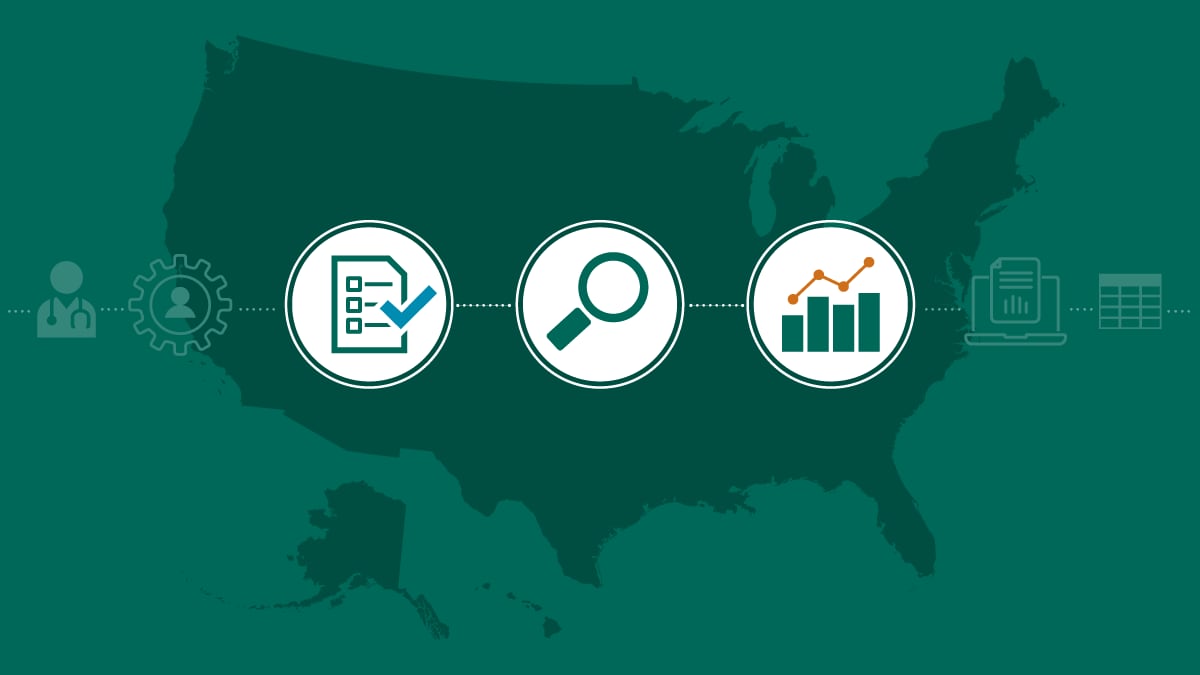Purpose
- National Center for Health Statistics (NCHS) offers a variety of programs, services, and resources.
- They can support health research, data analysis, and evidence-based policy.
- Use them to connect with our data and analysis, get support for your health research, and make decisions based on data.

Background
In addition to collecting, analyzing, and sharing health data, the National Center for Health Statistics (NCHS) supports others who do similar work. Our programs, services, and resources connect people with our data and analysis, inform health research, and help ensure that health programs and policies are evidence-based.
Classification of Diseases, Functioning, and Disability
The International Classification of Diseases (ICD) is a standardized system used to code causes of death data from death certificates. The World Health Organization developed ICD and designated NCHS to coordinate the use, interpretation, and revision of ICD in the United States.
Collaborating Center for Questionnaire Design and Evaluation Research
The Collaborating Center for Questionnaire Design and Evaluation Research (CCQDER) evaluates questions for use in surveys and other data collections. CCQDER uses cognitive interviewing and other methods to develop and evaluate questions. CCQDER also conducts research to improve question evaluation methods and develops resources to improve data collection and analysis.
Collaborating Office of Medical Examiners and Coroners
The Collaborating Office for Medical Examiners and Coroners (COMEC) brings together resources from across CDC to support the work of the medical examiner and coroner community. The COMEC website is updated frequently as CDC programs and other sources develop new materials.
Data Linkage Program
The NCHS Data Linkage Program combines two or more datasets that have some related variables to create a new dataset. Each new linked dataset maximizes the value of the original data. Researchers can analyze the new linked dataset to understand the relationships between different variables using data collected separately. Often, linked data can better answer complex questions about American health than individual data sources can. This is particularly helpful for developing evidence-based policies to improve health.
Growth charts
NCHS has worked with other CDC experts to develop clinical growth charts based on National Health and Nutrition Examination Survey data. These charts are a tool that health professionals can use to determine if a child's growth aligns with usual growth patterns for children in the United States. The growth charts consist of a series of percentile curves that illustrate the distribution of selected body measurements in U.S. children. Pediatricians, nurses, and parents have used our growth charts to track the growth of infants, children, and adolescents in the United States since 1977.
Health, United States
NCHS regularly produces the Health, United States report on behalf of the secretary of the U.S. Department of Health and Human Services (HHS). This report to the president and Congress presents trends in health statistics used by policymakers, public health professionals, and the public. In addition to compiling key findings from NCHS surveys and data collections and other CDC programs, Health, United States uses data from other federal agencies, as well as private and global sources.
Healthy People
The Healthy People initiative guides national health promotion and disease prevention efforts to improve the health of the nation. Healthy People identifies science-based objectives with targets to monitor progress and motivate and focus action. HHS has released new Healthy People objectives every decade since 1980. NCHS provides data-related support to HHS for developing and tracking progress toward Healthy People objectives. NCHS also has developed a tool to help expert workgroups set Healthy People objective targets.
National Death Index
The National Death Index (NDI) is a resource to help researchers find out if participants in their studies have died. NDI also can help researchers learn selected details from thier study participants' death certificates. NDI provides the public health and medical research community a single source for obtaining selected mortality data for approved uses. NDI can be used only for approved research purposes. NDI users pay a fee based on their data needs and project size.
Publications and Information Products
NCHS data and analyses are released in a variety of formats, including scientific reports. Our reports feature health estimates, trend data, and other useful public health information. People and groups use this information to make evidence-based decisions, create health-focused policies, allocate resources, identify needs-based programs, and more.
Research and Development Survey
The Research and Development Survey (RANDS) is an ongoing survey series. RANDS uses private companies' panel surveys to perform methodological research. Methodological research is the study of how research and evaluation are carried out to ensure this work is effective. RANDS also supplements the work of NCHS's Collaborating Center for Questionnaire Design and Evaluation Research.
Research Data Center
NCHS operates the Research Data Center (RDC) to allow researchers access to sensitive data that cannot be shared publicly. The RDC protects the confidentiality of survey participants, study subjects, and others who entrust NCHS with sensitive data, while also providing access to these restricted-use data for approved statistical purposes. Researchers must submit an application outlining the need for access to restricted-use data. The fee for using RDC data is based on the how many data files researchers are approved to access.
